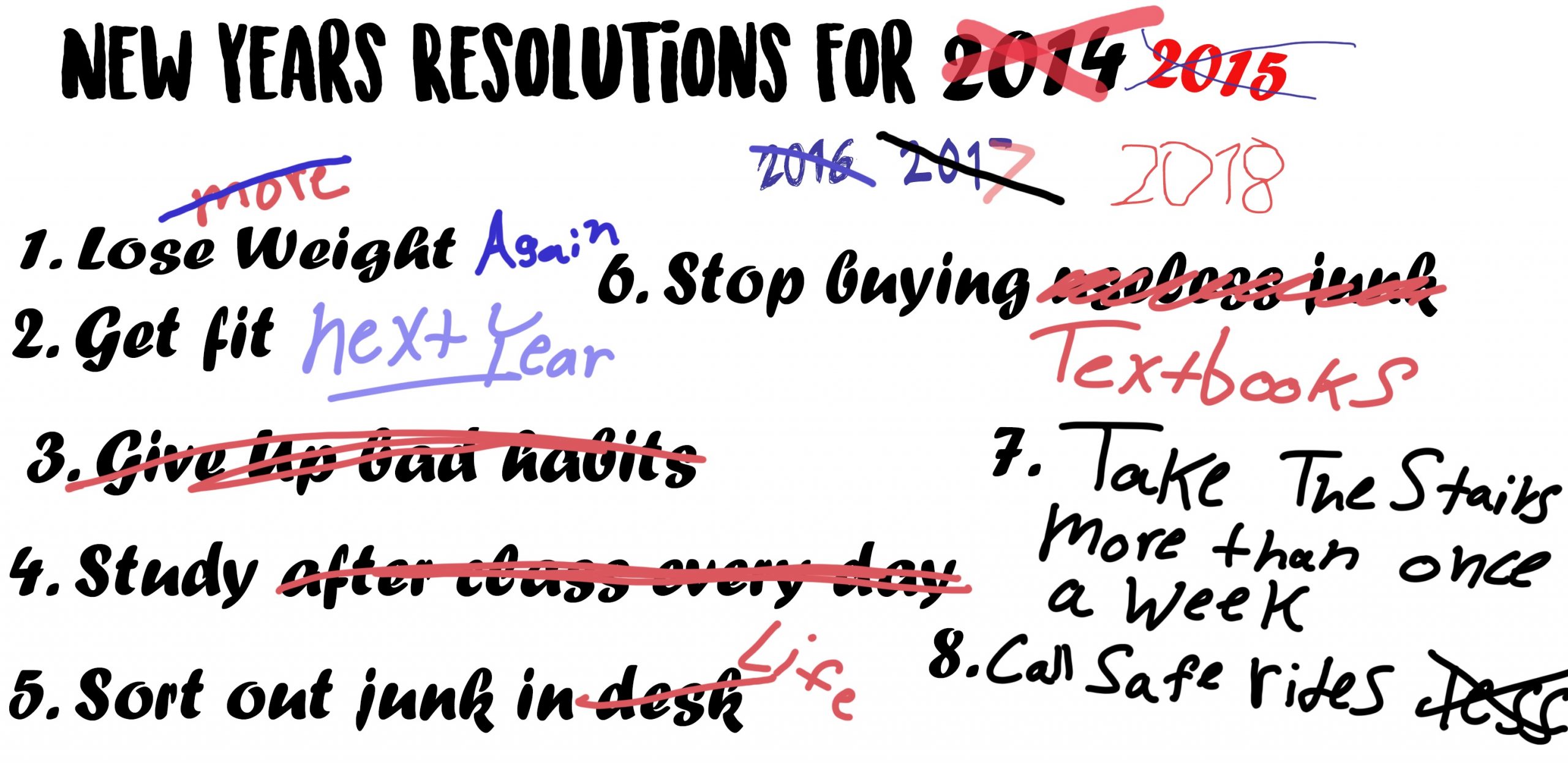Most people have heard the saying “new year, new me” that generally goes hand in hand with the concept of New Years resolutions.
Yes, this is a concept because out of the estimated 80 percent of Americans that make new years resolutions approximately only 8 percent of people actually follow through with them.
Although we are already halfway through February, I believe that people have either kept up with their resolutions or have given up on them altogether.
I am in the given up all together category because I’m incredibly lazy (as many college students are).
Hopefully after reading this you can find ways to keep up your resolutions, or at least find a way to better your lifestyle.
So why do resolutions fail?
First of all, they are incredibly unspecific.
Probably one of the most common resolutions I have heard is “I want to get healthy this year” but when faced with reality, healthy never happens.
Also, how a person defines healthy can be completely different between individuals, which makes resolution support difficult.
If you don’t know what you want, how can other people help you achieve what you want?
Second, the goals are unrealistic.
Another common resolution is “I want to go the gym (insert number here) times a week.” Seriously?
You might have gone to the gym once a month last year, and that could be an exaggeration.
If you are setting unrealistic goals this will only lead to failure and the guilt that comes with it.
This doesn’t benefit anyone.
Third, they are based on willpower, which (once again) varies from person to person.
People say, “I want to walk more” which has people thinking “oh, I will park my car 10 minutes away and walk” but we all know that during winters in Minnesota this will not happen, ever.
Now the hardest part about resolutions is failure.
Failing at our resolutions has negative implications and after enough fails we start to distrust ourselves.
If you’ve set the same resolutions for 5 years, and you never follow through, what makes you think you’ll be different this year?
Just a few points to ponder.
Now, after all the negativity, we will focus on the positives and how to keep up (or finally start) your New Years resolutions.
Start to think about your intentions or reasons for your resolutions.
Is the resolution you are setting rational and meaningful?
Or is it coming from a place of insecurity or other negativities?
You are more likely to continue your resolution if the meaning of it is positive.
Because of this you should be choosing your goals based on your own happiness and wellbeing.
Please keep in mind that not all of your goals can be achieved at once, you need to pace yourself.
Life isn’t a sprint, it’s a marathon.
Save yourself the guilt and disappointment by making a plan to achieve your resolution.
You should break it down into different pieces and focus on a part or two that is more manageable.
You should choose a goal that will have the greatest influence on your happiness, well-being, and sense of fulfillment.
After you do that you should decide when and how often to look at your progress.
When you experience short-term success, and meet your daily/weekly goals, you will be more motivated to keep going.
Sometimes it is helpful to keep a journal.
Writing notes on paper or on your phone can help track your progress.
By keeping track and taking notes as you go, you will have the ability to reflect and improve (if needed) on your resolutions.
If you find yourself in a sticky spot or a bad situation then you can take a look at your comments, and from there go back to see what you did previously.
As stated previously, support is incredibly important when maintaining resolutions.
Friends and family can hold you accountable and encourage you when you are having a tough time.
So, you should surround yourself with positive people close to you that want to see you succeed.
You should even consider joining a club or a group of people that have similar goals as you.
Another key point is patience.
As tough as life is, you need to remain patient.
You may not see or feel progress right away, which means you will have your ups and downs.
As much as this sucks, maintaining patience is a key component to the success of your resolution.
If at a point you feel discouraged or upset with yourself, look and evaluate the problems and see what you can do to fix them.
You need to think of this experience as a journey, and not a chore.
When you finally experience success, enjoy it.
Give yourself a reward and keep the hard work coming.
As childish as this sounds, self-rewarding is an amazing technique to maintain healthy and positive life choices.
So, the moral of the story (although this wasn’t really a story) is not to be afraid to start over; it’s a new year and therefore a brand-new opportunity to rebuild your life.
Just remember that the best is yet to come.
